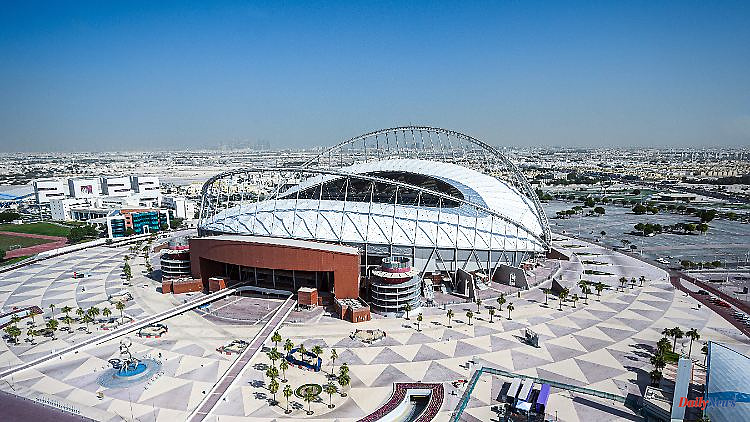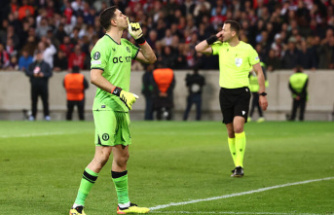Can a World Cup really be staged in an environmentally friendly way? FIFA says at least: climate neutral. This statement has been criticized for various reasons. The World Football Association rejects all of these voices.
FIFA President Gianni Infantino held up a green card for the camera on World Environment Day. For the planet. The world football association never tires of emphasizing that the 2022 World Cup in Qatar should be climate-neutral. That's hard to believe given the mega event for which several new stadiums were built and tens of thousands of people fly halfway around the world.
But what does climate neutral mean? This means that there is a balance between the emissions caused and the greenhouse gases removed from the atmosphere, explains Marcel Kruse from the German Emissions Trading Authority of the Federal Environment Agency. Specifically: You compensate for emitted greenhouse gases by investing in climate protection projects and receiving CO2 certificates for them. What is important, however, is the reduction of emissions. "Our mantra is: avoiding emissions comes first. Then reducing them. And if there is no other way: compensation," says Kruse.
Some of those who are committed to climate neutrality have not reduced their emissions significantly in the end, says Professor Wolfgang Lucht from the Potsdam Institute for Climate Impact Research. "People prefer to look around to see if others can reduce rather than doing it themselves." Originally, the term was only intended to describe the compensation for a last remnant of unavoidable emissions. But now it is being used more and more often for avoidable emissions, explains the sustainability researcher.
There is no question that emissions are caused before and during a global event like the soccer World Cup. But how many are there? The preliminary analysis commissioned by FIFA by a Swiss agency comes to a good 3.6 million tonnes of CO2 equivalents. The areas of (air) travel, infrastructure (stadiums) and accommodation account for by far the largest share of this.
The game will be played in eight new stadiums, one of which will be built from shipping containers - and according to the organizers it will only be temporary and can be completely dismantled. All are equipped with air conditioning. FIFA is "fully aware that climate change is one of the most urgent challenges of our time" and believes "that each of us must take immediate and sustainable action to protect the climate," said the association at the request of the Germans Press Agency with.
Looking at the footprint for the seven new permanent World Cup stadiums, it is noticeable that the emissions caused during construction are spread over an assumed service life of 60 years. And only the emissions for 70 days (World Cup plus two club World Cups) are included in the calculation - for stadiums that would not have been built without the World Cup. Climate scientist Lucht calls this greenwashing. This is what a strategy is called that aims to make a company appear more sustainable than it actually acts.
The Carbon Market Watch association estimates that the greenhouse gas footprint of the newly built permanent stadiums could be up to eight times higher. Among other things, the non-profit organization advocates appropriate pricing of CO2. Scientists from the University of Lancaster also looked at the preliminary analysis: They come up with a value at least three times as high for the entire World Cup, said climate researcher Mike Berners-Lee recently to the BBC.
FIFA rejects all of this. According to the umbrella organization, the calculations are a conservative estimate in accordance with the Greenhouse Gas Protocol. This protocol is considered to be the most widespread standard for preparing greenhouse gas balances. Changes compared to these assumptions "will be reflected in the ex-post report and will be fully offset," according to FIFA.
Speaking of offsetting: "Emissions should be compensated for when they occur," says environmental expert Kruse with a view to the construction of the stadiums. If you support climate protection projects through compensation in order to receive certificates for them - then these projects would have to be created additionally. As compensation, no projects could be financed that would have existed anyway, explains Kruse. As an example, he cites those in the field of renewable energies that are financially self-supporting.
It is precisely this additionality that is questionable for the projects that have so far been approved by Qatar's CO2 compensation program, the Global Carbon Council. The organizing committee works with him. The program has only accepted six projects so far, including a solar project in India and a hydropower project in Turkey. However, FIFA points out that the three World Cup organizers procured their CO2 certificates separately. You yourself will not offset emissions via the Global Carbon Council. "The bidding process is in the final phase," said the world association. Its portfolio for CO2 compensation will be announced in good time.
The organizing committee responded to questions about the certification of the stadiums and carbon offsetting projects with a general statement on sustainability projects. It pointed out that the sustainability label - awarded by an institute closely linked to the Qatari state - had been approved by FIFA for the World Cup stadiums.
The discussion about the allegedly climate-neutral mega-event for sustainability researchers Lucht does not come in time. But the scientist thinks it's good that responsibility for the climate is also an issue in sport. "No one should be deprived of the joy of such an event. But as far as the climate is concerned, in the end we will not only get there with technical measures - we will also have to think about behavioral changes." How could a football World Cup be organized differently in terms of climate protection? "There is no painless answer to this question," says Lucht. "But we have to face the problem."












